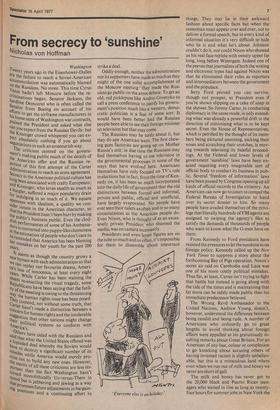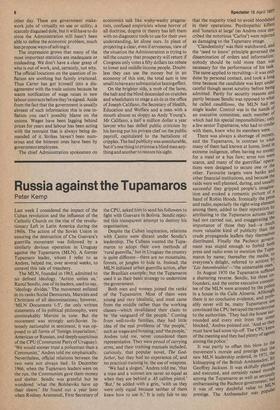From secrecy to 'sunshine'
Nicholas von Hoffman
Washington Twenty years ago in the Eisenhower-Dulles era the failure to reach a Soviet-American accommodation was automatically blamed Oil the Russians. No more. This time Cyrus Vance hadn't left Moscow before the recriminations began. Senator Jackson, the hardline Democrat who is often called the Senator from Boeing on account of his e. frorts to get the airframe manufacturers in Ills home state of Washington war contracts, Praised the President and asked what else can You expect from the Russian Devils: but the Kissinger crowd whispered you can exPect absolutely nothing if you go about negotiations in such an amateurish way.
The criticism centred on the government's making public much of the details of the American offer and the Russian reJection of this first attempt of the Carter Administration to reach an arms agreement.
eerecY in the American political culture has 'mg been associated with crafty Europeans, and Kissinger, who loves stealth as much as a burgler, suffered a major popularity drain fOr indulging in so much of it. We equate n.Penness with idealism, a quality we consider innate in the American character, so that the President hasn't been hurt by making t,t!e Public's business public. Even the clodudish Performances of some of his Ambassa. ors is converted into puppy-like clumsiness Ibn the estimation of people who don't care to ke reminded that America has been blaming "er mistakes on her youth for the past 200 Years.
n It seems as though the country grows a „ew hymen with each administration so that "le, can replay our favourite drama, America s loss of innocence, at least every eight YsLears. While Carter has been staining the ,neets re-enacting the ritual tragedy, some Wit:1'(.ePublicans have been saying that the futiliY of the meeting is owing to the threatening ay the human rights issue has been posed. they contend, not without some truth, that arter hasn't made a distinction between a
cern for human rights and the intolerable tshuggestion that other nations might change
A eir Political systems to conform with tArnerica,s. saOthers have sided with the Russians and a !fzi that what the United States offered was 1°Psided deal whereby the Soviets would to destroy a significant number of its mmisslies while America would merely protkise not to build any new ones. However, "e merits of all these criticisms are less imtPortant than the fact Washington hasn't u riled monolithically Us-versus-Them in _ t'"Finod but is jabbering and jawing in a way Promises future adjustments in bargain"g Positions and a continuing effort to
strike a deal.
Oddly enough, neither the administration nor its supporters have made as much as they might of the one solid accomplishment of the Moscow meeting: they made the Russians go public on the arms debate. To get an old, red picklepuss like Andrei Gromyko to call a press conference to justify his government's position much like a western, democratic politician is a feat of some sort. It would have been better had the Russian people been able to see their foreign minister on television but that may come. The Russians may be tardy about it, but they do ape American ways. The first chewing gum factories are going up on Mother Russia's soil; in due time the Russians may find themselves having to use television in the governmental processes in some of the ways that have evolved here. Americans themselves have only focused on TV's role in elections but in fact, from the time of Kennedy on, it has been so much incorporated into the daily life of government that the old distinctions between formal and informal, private and public, official and unofficial, have largely evaporated. No people have ever seen their rulers as often and in so many circumstances as the American people do. Even Nixon, who is thought of as an excessively private President who shunned the media, was on camera incessantly.
Presidents and even lesser figures are on the tube so much and so often, it's impossible for them to dissemble about important things. They may lie in their awkward fashion about specific facts but when the statesman must appear over and over, not to deliver a formal speech, but in every kind of informal situation it's very difficult to hide who he is and what he's about. Johnson couldn't do it, nor could Nixon who showed us his real face replete with sweaty upper lip long, long before Watergate. Indeed one of the peeves that journalists of both the writing and electronic types had against Nixon was that he eliminated their roles as reporters and intermediators between the government and the populace.
Jerry Ford proved you can survive, though not prosper, as President even if you're shown slipping on a cake of soap in the shower. So Jimmy Carter, in conducting diplomacy in the same mode, is only extending what was already a powerful drift in the direction of minimising what is to be kept secret. Even the House of Representatives, which is petrified by the thought of its mem bers being pictured snoozing, picking their noses and scratching their crotches, is moving towards televising its baleful proceed ings. At the Federal and lower levels of government 'sunshine' laws have been enacted requiring every imaginable sort of official body to conduct its business in pub lic. Several 'freedom of information' laws have been passed by Congress opening up all kinds of official records to the citizenry. An American can now go to court to compel the Federal Bureau of Investigation to hand over its secret dossier to him. So many people have availed themselves of the privilege that literally hundreds of FBI agents are assigned to swiping the agency's files to satisfy the demands of thousands of people who want to know what the G-men have on them.
From Kennedy to Ford presidents have resisted the pressures to let the sunshine in on foreign policy. Kennedy called up the New York Times to suppress a story about the forthcoming Bay of Pigs operation. Nixon's secret air raid on Cambodia and Laos was
one of his more costly political mistakes. Thus far, at least, Carter isn't trying to fight
that battle but instead is going along with the tide of the times and is maintaining that far more can be safely made public than his immediate predecessor believed.
The Wrong Revd Ambassador to the United Nations, Andrew Young, doesn't, however, understand the difference between being candid and being rude. A number of Americans who ordinarily go to great lengths to avoid thinking about foreign affairs were appalled at his gratuitously insulting remarks about Great Britain. For an American of any hue, colour or complexion to go knocking about accusing others of having invented racism is slightly unbelievable, but this is a miraculous land where even when we run out of milk and honey we never are short of gall.
The milk and honey has never got to the 20,000 black and Puerto Rican teen agers who waited in line as long as twentyfour hours for summer jobs in New York the other day. These are government makework jobs of virtually no use or utility, a scarcely disguised dole, but it will have to do since the Administration still hasn't been able to define the economic problem, much less propose ways of solving it.
The impression grows that many of the most important statistics are inadequate or misleading. We don't have a clear grasp of who is out of work, and, certainly, not why. The official locutions on the question of inflation are soothing but faintly irrational. Thus Carter has got himself into a disagreement with the trade unions because he wants notification of wage raises in new labour contracts before they're signed. Aside from the fact that the government is usually abreast of such information this is one inflation you can't possibly blame on the unions. Wages have been lagging behind prices for years and labour has been acting with the restraint that is always being demanded of it. Strikes haven't been numerous and the bitterest ones have been by government employees.
The chief Administration spokesmen on economics talk like wishy-washy pragmatists, confused empiricists whose horror of all doctrine, dogma or theory has left them with no diagnostic tools to use for their own understanding, let alone ours. In place of projecting a clear, even if erroneous, view of the situation the Administration is trying to tell the country that prosperity will return if Congress only votes a fifty dollars tax rebate to lower and middle income people. Doubtless they can use the money but in an economy of this size, the total sum is too small to have any substantial or lasting effect.
On the brighter side, a mob of the lame, the halt and the blind descended on crutches and wheelchairs to stage a sit-in in the office of Joseph Califano, the Secretary of Health, Education and Welfare and a man with a mouth almost as sloppy as Andy Young's. Mr Califano, a half a million dollar a year lawyer who has defied public criticism by his having put his private chef on the public payroll, capitulated to the battalions of cripples. The bad publicity was unendurable, but it's one thing to promise a blind man anything and another to restore his sight.







































 Previous page
Previous page